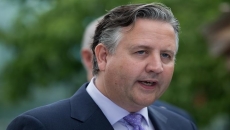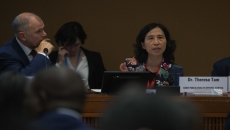Canada's chief public health officer warned Monday there is still a lot we don't know about the virus that causes COVID-19, but said stopping this pandemic or preventing a future one will require more than just physical distancing and handwashing.
Dr. Theresa Tam said we simply do not know yet whether someone who has had COVID-19 will be immune from getting it again, or how long that immunity will last. The World Health Organization warned last week it is premature to give the all-clear for resuming normal activities to people who have recovered from COVID-19, because there is some evidence that some patients have contracted the novel coronavirus a second time.
Tam said Monday these are critical questions the immunity task force she is part of seek to answer as Canada tries to make critical decisions about how to lift the extreme restrictions on public gatherings without throwing the door wide open for the virus to spread rapidly amongst the population.
But Tam said what she does know is that to stop COVID-19, and to prepare better for the next wave of this or another global virus, Canada has got to do something immediately to address the "social, cultural and economic" conditions she said contributed to allowing COVID-19 to disproportionately affect vulnerable populations and essential workers.
"The bad bugs are not going away so if we are to end the tragedy of increased disease and death rates in vulnerable populations we need to make things right, right now," Tam said during her regular briefing in Ottawa.
"This is not just someone else's problem or someone else's sorrow. Inequities touch us all,"she said. "They affect the health and social well-being of all Canadians just as they diminish our humanity."
While many communities appear to have community transmission under control, the virus is continuing to wreak tragic consequences in group housing settings, like long-term care homes, homeless shelters and prisons.
At least half the Canadians who have died of this disease so far lived in long-term care homes, and in Ontario and Quebec, more than three in four deaths are linked to the facilities. Both provinces have requested help from the military because it's not only those living in these homes who were vulnerable, but also those looking after them. Ontario reported on the weekend that 1,181 staff in long-term care homes are sick. Quebec says 4,000 health workers have tested positive, and another 5,500 are in isolation.
Prime Minister Justin Trudeau said last week there will be tough questions to face about how Canada's seniors were not better protected from the virus, and how it got so bad that we need to send in the military to help.
Wages could be part of the issue in recruiting and maintaining qualified staff — both Ontario and Quebec boosted hourly wages for essential workers this month. Quebec Premier Francois Legault also pointed fingers at private operators, saying last week he was considering making all care homes public. He also said the facilities needed more workers and more space to keep residents apart to prevent the virus from spreading like wildfire.
The Canadian Red Cross was moving some long-term care residents with COVID-19 in one part of Montreal to a local arena for treatment.
Tam said the idea of moving sick patients elsewhere is being discussed in other areas too but she said it is complicated by the high level of care many of those patients require.
Ontario NDP MP Charlie Angus said the changes to come after the COVID-19 crisis has passed must include a full rethink of the pillars of globalization and privatization upon which Canada's economy has been built.
"What is staggering about this virus is that all the myths about our economy crumbled almost overnight," said Angus. "Millions of people, within one week, didn't have enough money to pay the rent."
Global supply chains for critical medical equipment failed us and our allies were taking equipment we ordered right out from under us, said Angus.
The NDP is kicking off a task force this week to consult with the public and some of Canada's leading experts on economics and finance, to ask and try and find answers to what went so wrong and how we fix it.





